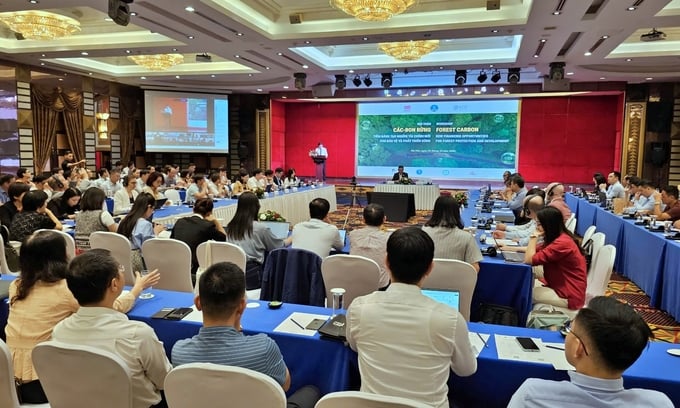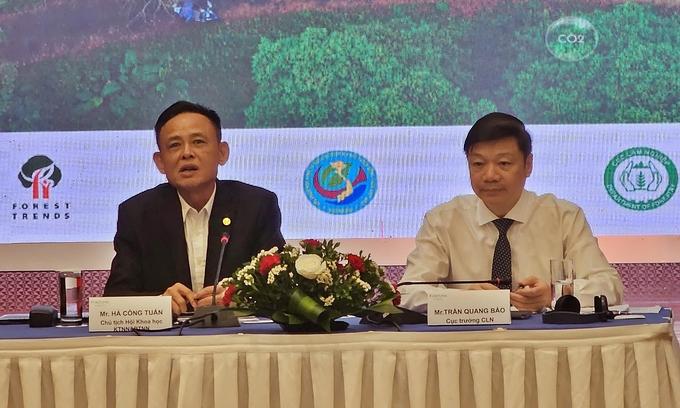November 27, 2025 | 15:47 GMT +7
November 27, 2025 | 15:47 GMT +7
Hotline: 0913.378.918
November 27, 2025 | 15:47 GMT +7
Hotline: 0913.378.918

The workshop attracted the participation of about 150 delegates. Photo: Bao Thang.
On the morning of October 3, the Department of Forestry, in collaboration with the Association of Agricultural and Rural Development Economics, organized the Workshop “Forest Carbon - Potential to Create New Financial Sources for Forest Protection and Development” with the sponsorship of Forest Trends and UK PACT.
The workshop attracted the participation of about 150 direct delegates and nearly 250 online connections nationwide.
In his opening speech, Associate Professor Dr. Tran Quang Bao, Director of the Department of Forestry, said that forestry is currently the only sector with the potential for negative net emissions, thanks to the process of forest protection and development and the support of international partners. However, the forest carbon market in Vietnam is still in its early stages, facing many difficulties and challenges.
The carbon market originated from the Kyoto Protocol to the United Nations Framework on Climate Change, adopted in 1997. Accordingly, countries with excess emission rights are sold to or purchased from countries that emit more or less than their committed targets.
Since then, a new type of commodity has appeared in the world: greenhouse gas emission reduction/absorption certificates. Because carbon is the equivalent greenhouse gas of all greenhouse gases, transactions are generally called carbon trading and exchange, forming a carbon market or carbon credit market.
The Department of Forestry (Ministry of Agriculture and Rural Development) said that the world's carbon market currently operates in two ways: Voluntary international and domestic carbon markets (mandatory).
Accordingly, the voluntary international carbon market aims at the need for voluntary carbon credit trading to serve the social responsibility of enterprises and build public image, and create more credit supply for the domestic carbon market.
Voluntary carbon markets are often based on bilateral or multilateral contracts and cooperation agreements between organizations, companies or countries. Therefore, the price of carbon credits is regulated by the market (supply-demand).
Recently, Vietnam received USD 51.5 million from the World Bank (WB) for successfully transferring 10.3 million tons of CO2 in 6 provinces in the North Central region. Currently, the Ministry of Agriculture and Rural Development is completing the dossier to submit to the Prime Minister for consideration and negotiation, signing the Emission Reduction Purchase Agreement for 11 provinces in the Central Highlands and South Central region with the Forestry Finance Enhancement Organization (Emergent).
"The forest carbon market has the potential to generate large revenues for forestry, helping to invest in forest protection, creating jobs, increasing income for local people, while protecting and improving environmental quality," said Mr. Bao, admitting that financial resources for forestry activities are still unstable, meeting only a small part of actual needs.

Former Deputy Minister of Agriculture and Rural Development Ha Cong Tuan and Director Tran Quang Bao chaired the workshop. Photo: Bao Thang.
The Forestry Department also identified 7 essential tasks to promote market development and commercialization of forest carbon credits in the coming time. These are:
(1) Review and update the nationally determined contribution in the forestry sector; (2) Study the potential and allocate quotas for emission reduction and carbon sequestration from forests to localities;
(3) Perfect the policy and institutional framework on the transfer and financial management of revenue from forest carbon credits; (4) Develop Vietnam forest carbon standards, methodology for calculating emission reduction results, and a system for measuring, reporting, and appraising the amount of emission reduction and increased carbon sequestration of forests; guide the development and pilot implementation of several potential projects;
(5) Disseminate and enhance capacity for stakeholders on forest carbon; (6) Continue to implement the Emission Reduction Payment Agreement with the World Bank; advising on negotiations, signing and implementing the Emission Reduction Trading Agreement for the Central Highlands and South Central regions with the Emergent Organization; (7) Strengthening cooperation, mobilizing international resources and the private sector.
For localities, the Director of the Forestry Department proposed proactively mobilizing and integrating legal resources to reduce emissions and increase forestry absorption in the province while calling for the active participation of relevant parties to promote the sustainable development of the forest carbon market.
"The cooperation and commitment of all relevant parties will be the decisive factor for the success of the forestry sector in the new context," Bao emphasized.
Dr. Ha Cong Tuan, former Permanent Deputy Minister of Agriculture and Rural Development and chairman of the Agricultural and Rural Development Economics Association, suggested that management agencies develop and issue more initial financial mechanisms to support forest owners, especially vulnerable ones. It is a way for these groups to have easier access to forest carbon funds.
Translated by Huong Giang

(VAN) After the institutional merger, Da Nang possesses significant forest-carbon reserves and is proactively engaging in the carbon market, creating a new revenue stream.

(VAN) An Giang strengthens communication against IUU fishing, increases inspections and sanctions, and is determined to remove the EC’s “yellow card” while developing a sustainable fisheries sector.

(VAN) As green transition becomes a global trajectory, Viet Nam’s biggest challenge is not only technology and models, but how to ensure that capital flows reach the right beneficiaries.

(VAN) The Ministry of Agriculture and Environment must spearhead the construction of green governance, spanning decision-making processes and investment standards to policy evaluation mechanisms.

(VAN) The Agriculture and Environment sector of Khanh Hoa has achieved numerous milestones over the past 80 years, contributing significantly to the goal of establishing the province as a centrally governed city by 2030.

(VAN) Viet Nam is entering the pivotal period of 2025-2030, moving toward the formulation of the Remote Sensing Law, which will establish a legal foundation for the development of national digital data.

(VAN) The agricultural sector is finalizing the strategic framework for emission reduction, setting the goal of sharply cutting methane and 403.7 million tons of CO2 equivalent and moving toward Net Zero by 2050.